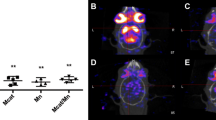Abstract
Using a quantitative cytochemical technique for measuring beta-glucuronidase activity in the peripheral nerves of mice, we have investigated the effectiveness of four potential adjuncts for reducing the dose limiting neurotoxicity of misonidazole (MISO) in the clinic. Under the conditions used, the most effective adjunct was the steroid anti-inflammatory agent dexamethasone. When given over the week previous to MISO treatment, this agent almost completely eliminated the MISO neurotoxicity as determined at week 4 after commencement of MISO dosing. The second most effective adjunct was phenytoin, the third flurbiprofen and the last adjunct, phenobarbitone, was ineffective. Dexamethasone, phenytoin and phenobarbitone all reduced the clearance half-life of MISO and hence the drug exposure dose calculated as the area under the curve of MISO tissue concentration against time. However, no correlation was evident with these parameters and MISO neurotoxicity in the mouse. Dexamethasone, whilst affording protection against MISO toxicity, did not alter the radiosensitivity of the anaplastic MT tumour.
Similar content being viewed by others
Rights and permissions
About this article
Cite this article
Sheldon, P., Clarke, C. & Dawson, K. The effect of phenytoin, phenobarbitone, dexamethasone and flurbiprofen on misonidazole neurotoxicity in mice. Br J Cancer 49, 207–213 (1984). https://doi.org/10.1038/bjc.1984.33
Issue Date:
DOI: https://doi.org/10.1038/bjc.1984.33
- Springer Nature Limited




